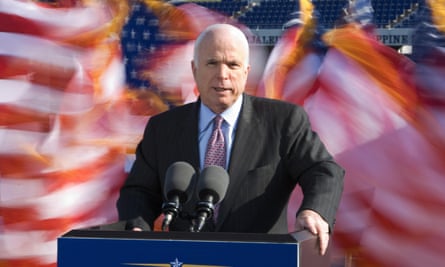Winston Churchill supposedly said: “Americans will always do the right thing, only after they have tried everything else.” In his new book, Andrew Bacevich goes far towards proving the second half of that sentence and casts doubt on the first, without offering much in the way of alternatives.
In what is mostly a social history of the post-cold war era – don’t expect to find an analysis of the Balkan wars – Bacevich seeks to chronicle how the US “wasted little time in squandering the advantage it had gained”. Few would disagree.
Yet he defines America’s supposed post-cold war consensus as “globalized neoliberalism”, “global leadership”, “freedom” (as the expansion of personal “autonomy, with traditional moral prohibitions declared obsolete and the removal of constraints maximizing choice”), and “presidential supremacy”. The 2016 election, he writes, presented the “repudiation of that very consensus”.
The villains in this telling are the elites who pushed the consensus heedless of other views or interests – “expectations raised, but unfulfilled; outraged citizens left with no place to stand” – to the point where Donald Trump was elected and no one could understand why.
In 2016, he writes, “financial impotence was to turn into political outrage, bringing the post-cold war era to an abrupt end. As for the people who shop for produce at Whole Foods, wear vintage jeans and ski in Aspen, they never saw it coming and couldn’t believe it when it occurred.”
Bacevich argues that the seeds of this failure were present throughout the cold war, notably in Vietnam and Ross Perot’s insurgent White House run in 1992. But how could there ever have been a “consensus” if the country were so divided?
We have been here before, both in the history of the US and of ideology. Post-1989 featured the same “universal self-congratulation and flinging up of caps” that Thomas Carlyle critiqued in The French Revolution. Bacevich is right to criticize it again. But it is surely wrong to claim, for instance, that “Reagan’s entire presidency was a pseudo-event, its achievements based on the masterful creation and manipulation of images”. Mikhail Gorbachev, for one, doesn’t think so.
Acerbic, even curmudgeonly – his catalogue of America’s social ills is harsh but fair – Bacevich veers between the commonplace and the sarcastic. “The promotion of globalization included a generous element of hucksterism,” he writes, “the equivalent of labeling a large cup of strong coffee a ‘grande dark roast’ while referring to the server handing it to you as a ‘barista’.”
Clearly, for those who favor an expansive role for America and the west, and operating according to the principles of grand statecraft, the post-cold war years were the years the locust has eaten. Social mobility declined. The plight of the poor worsened. But JD Vance wrote more sensitively about this in Hillbilly Elegy and Bacevich adds little on either the wars or the peace.
Even if the Donald Rumsfeld-endorsed, technology-friendly “Revolution in Military Affairs” only “purported to describe the culmination of a long evolutionary march toward perfection”, which great power today does not rely on technology for military might? And what, other than isolationism, “would preclude the possibility of another Vietnam”?
Similarly, even as he chronicles their failures Bacevich is harshly critical of the view that presidents direct history. Abraham Lincoln, call your office. FDR too.
The “elites” Bacevich chides had many faults, and no president of the period left office fully content. But sometimes the author’s strategy, as well as his history, is simply wrong.
“The horrors of 9/11 notwithstanding,” he writes, “terrorism does not pose an existential threat to the United States and never has. As innumerable commentators have noted, terrorism is merely a tactic, and an ancient one at that.”
Yet “one nuclear bomb can ruin your whole day”, as the bumper sticker read, and any leader is responsible for maintaining vigilance. Which threats can be ignored? Air piracy? Chemical weapons? Nuclear smuggling? Bacevich never offers what he would do to states harboring terrorists, even while noting failures in Afghanistan and Iraq.
The book starts out critical of Trump but then takes a more nuanced position. Chiding Barack Obama as the one who “saved globalized neoliberalism” and “inadvertently laid the way for a powerful backlash”, he says Trump’s “detractors commit this categorial error. They confuse cause and effect. They charge him with dividing America.” Yet which other recent president attacked fellow citizens so harshly and took delight in smashing the norms of political debate?

Bacevich focuses on the neoconservative project in terms of wars but ignores its Burkean focus on domestic policy, not least David Brooks’ idea of “national greatness conservatism”, a very different thing than Maga. John McCain, who articulated a similar vision of national purpose, and whose policies were designed to help Joe the Plumber far more than Trump has, gets one brief mention.
Some people saw what was happening and sought to answer the question Rabbit Angstrom asked and Bacevich cites: “Without the cold war, what’s the point of being an American?” They were ignored.
Bacevich now urges Americans to ignore the tweets and focus on events. But the tweets are events, the way in which the old guardrails are broken down and the boundaries of legitimate discourse weakened, which has let loose some very dangerous ideas, not least on race and republican norms. A tweet is not a notification to Congress under the War Powers Act.
Despite Bacevich’s call for conversation on issues formerly “beyond the pale” such as abandoning globalism and “militarism”, his book has a fatal weakness: he never quite says what or who he is for. He is too good a historian not to know there was a tendency of “anti-anti-communism” during the cold war. Perhaps his book is about “anti-anti-Trumpism”. But “the pale” is there for a reason
One hopes some future historian will find the seeds of success in our present troubles. Meanwhile, Americans must pick up the pieces as best they can.
